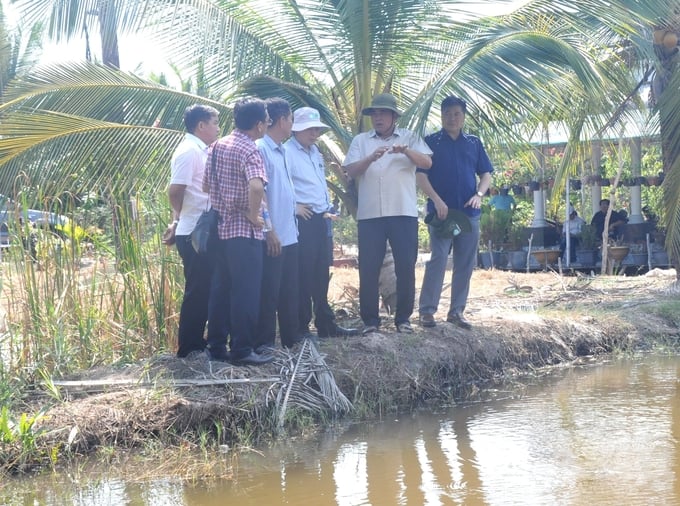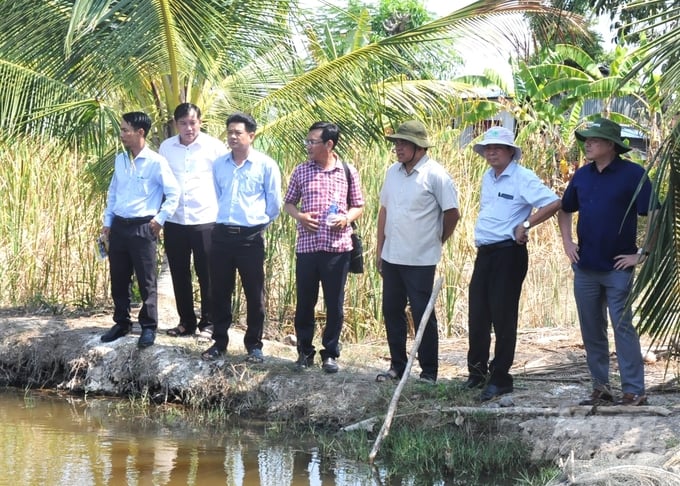June 2, 2025 | 12:00 GMT +7
June 2, 2025 | 12:00 GMT +7
Hotline: 0913.378.918
June 2, 2025 | 12:00 GMT +7
Hotline: 0913.378.918
Deputy Minister of Agriculture and Rural Development Tran Thanh Nam led a delegation from the Ministry to visit Kien Giang province on April 1. Accordingly, the delegation conducted a survey on local agricultural cooperatives which have been selected to participate in the "Sustainable Development Project for one million hectares of specialized, low-emission high-quality rice in association with green growth in the Mekong Delta region by 2030."
During the survey, the delegation visited Thanh An Shrimp Rice Crab Cooperative in Dong Thanh Commune, An Minh District and Phu Hoa Youth Agricultural Service Cooperative in Tan Hoi Commune, Tan Hiep District.

Deputy Minister of Agriculture and Rural Development Tran Thanh Nam (second from right) surveying agricultural cooperatives in Kien Giang province selected to participate in the Project for one milion hectares of high-quality rice. Photo: Trung Chanh.
The Thanh An Shrimp Rice Crab Cooperative operates on the basis of a crop rotation model, whereby rice and shrimp are alternatively intercropped with crab farming. According to Mr. Nguyen Van Khanh, Director of Thanh An Cooperative, the cooperative manages 140 hectares of production area, in combination with approximately 400 hectares of linked production areas. Within the last five years, the cooperative has transitioned to organic rice production, and signed contracts with Dai Duong Xanh Company for input supply and product offtake.
According to Mr. Khanh, members of the cooperative are eager to participate in the Project for one milion hectares of high-quality rice. Additionally, local farmers have experience in organic rice production, and they believe that the project's aim to reduce emissions will result in high production efficiency and multiple benefits.
Mr. Le Van Khanh, Head of An Minh district's Department of Agriculture and Rural Development, revealed that the district has planned an area of 38,900 hectares for rice-shrimp production. The district has also established 21 agricultural cooperatives operating on the basis of the rice-shrimp crop rotation model. The district's crop schedule runs from January to September for brackish shrimp and marine crab aquaculture, followed by rice planting combined with green shrimp farming from October to December.
An Minh district proposed to participate in the Project for one milion hectares of high-quality rice with its 20,000 hectares of rice-shrimp farming area (by 2030). Accordingly, the district requires investment support for transportation, irrigation, and warehousing infrastructure. Furthermore, An Minh aims to invest in five smart pest control stations to monitor fields and manage pests.
Special support will be provided for cooperative models that reuse straw for livelihood development, and apply biological and microbial technologies in straw processing to promote the development of natural feed in the rice-shrimp model.
Assoc. Prof. Dr. Mai Van Trinh, Director of the Institute for Agricultural Environment under the Vietnam Academy of Agricultural Sciences, assessed that the rice-shrimp farming model is cyclical and naturally advantageous. Consequently, this model is significantly more beneficial when paired with organic production processes. The rice-shrimp model is currently a sustainable agricultural production system. After the rice is harvested, the decomposed straw provides a source of feed for shrimp farming. Similarly, shrimp waste serves as nutrient sources for rice farming. This closed-loop cycle requires minimal additional investment from farmers, thereby reducing production costs.
"Local farmers are already familiar with organic production, so they will have additional opportunities to move towards low-emission and green rice production. The value of green-certified rice is considerably higher than that of regular rice. If farmers are able to participate in the Project for one milion hectares of high-quality rice with their rice-shrimp farming model, they will simultaneously enjoy three benefits: reducing emissions, increasing economic efficiency, and maintaining a sustainable ecosystem for agriculture and rural areas," emphasized Assoc. Prof. Dr. Mai Van Trinh.
According to Mr. Tran Cong Danh, Deputy Director of Kien Giang province's Department of Agriculture and Rural Development, Kien Giang Provincial People's Committee issued a decision regarding the province's contribution to the Project for one milion hectares of high-quality rice. Accordingly, Kien Giang will participate with an area of 200,000 hectares, to be implemented across 12 districts and cities within the province.
The implementation process will be divided into multiple stages. Namely, the primary objective of Stage 1 (2024-2025) is to expand the existing areas under the Vietnam Sustainable Agriculture Transformation Project (VnSAT Project) from 24,738 hectares to 100,000 hectares. The objectives of Stage 2 (2026-2030) include identifying key areas to develop investment projects for high-quality specialized rice farming, and reducing emissions on an additional 100,000 hectares for a total of 200,000 hectares.

Deputy Minister Tran Thanh Nam (third from the right) surveying the Thanh An Shrimp Rice Crab Cooperative, which has been proposed by Kien Giang province to participate in the Project for one milion hectares of high-quality rice. Photo: Trung Chanh.
Main activities under the Project will include selecting and developing selected areas, determining the participating acreage, reviewing and applying comprehensive technical packages to ensure sustainable development criteria, reorganizing production, conducting capacity-building training, investing in upgrading infrastructure in specialized production areas, mobilizing resources, and providing technical and financial support from carbon credit funds and other international support funds.
According to Deputy Minister Tran Thanh Nam, the Ministry of Agriculture and Rural Development has formed survey teams in key rice-producing areas with freshwater and brackish water ecosystems in order to carry out the Project for one milion hectares of high-quality rice.
"With regards to the rice-shrimp model in Kien Giang province, we plan to select it for participation in the Project due to its highly suitable and promising production model. Farmers implementing this model have actively adopted organic production processes, with businesses signing contracts to supply inputs and distribute products at high prices. However, rice-shrimp crop rotation requires strict adherence to crop schedules and application of technical procedures to achieve high efficiency," noted Deputy Minister Tran Thanh Nam.
Deputy Minister Tran Thanh Nam assessed that the organic rice-shrimp model, with low-emission processes, is suitable for participation in the Project for one milion hectares of high-quality rice. The success of the model will not only increase value and income for farmers, but also contribute to building a brand for environmentally friendly rice produced on shrimp farming land.
Translated by Nguyen Hai Long

(VAN) Seafood by-products are opening a new path, combining green growth and technological innovation to enhance the industry's value.

(VAN) Mr. Nguyen Thanh Cong, Vice Chairman of the Son La Provincial People's Committee, reflects on Son La’s journey from barren hills to fruitful orchards after a decade of hard work.

(VAN) FAO’s Director-General addresses the 5th Baghdad International Water Conference.
/2025/05/26/1716-4-nongnghiep-191706.jpg)
(VAN) Chain linkages, technological innovation, and raw material zoning are three strategic pillars for the coconut industry to strongly develop and elevate its position on the global agricultural map.
![Advanced mariculture – an inevitable trend: [4] Accompanied by scientists](https://t.ex-cdn.com/nongnghiepmoitruong.vn/608w/files/sohk/2025/05/13/1941-pgsts-vo-van-nha-140958_717.jpg)
(VAN) According to Assoc. Prof. Dr. Vo Van Nha, Director of the RIA III, the development of advanced offshore mariculture is no longer an option but an essential path for Vietnam’s fisheries sector.

(VAN) Vietnam is intensifying the development of mollusk farming areas that meet international standards, aiming for sustainable growth and enhancing its export position in the global seafood market.
![Advanced mariculture – an inevitable trend: [3] Policy-driven momentum](https://t.ex-cdn.com/nongnghiepmoitruong.vn/608w/files/doanhtq/2025/05/21/0104-0616-0348-nuoi-bien-170339_789.jpg)
(VAN) To ensure the success of offshore mariculture that uses advanced technologies, it is essential to establish supportive policies that inspire both individuals and enterprises to invest with confidence.